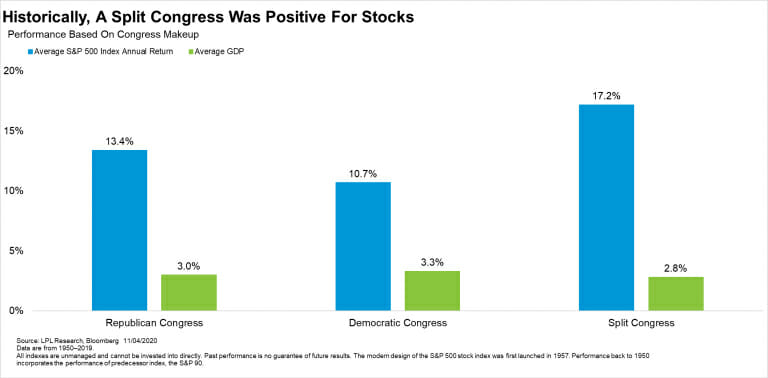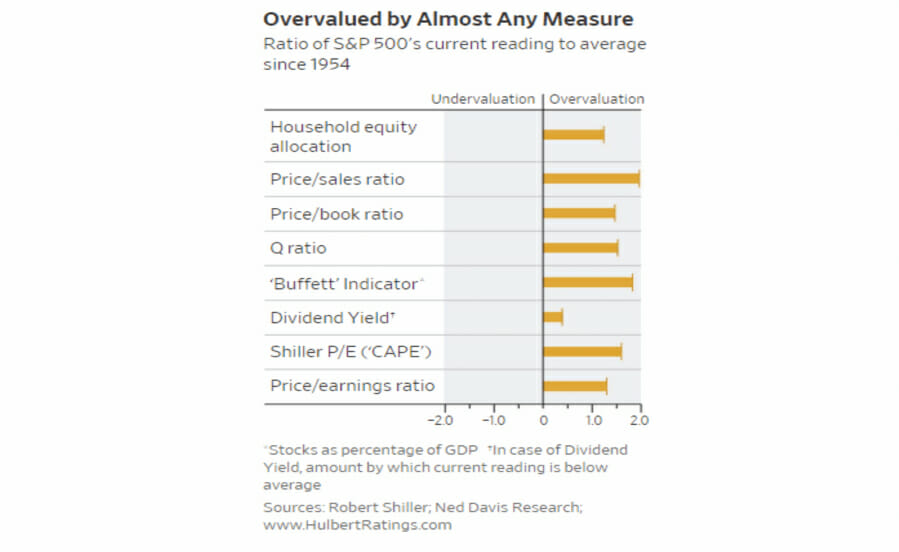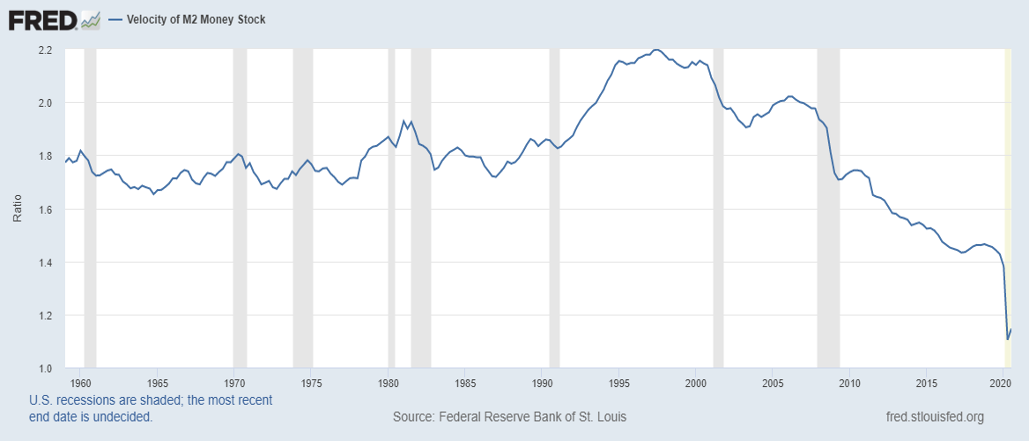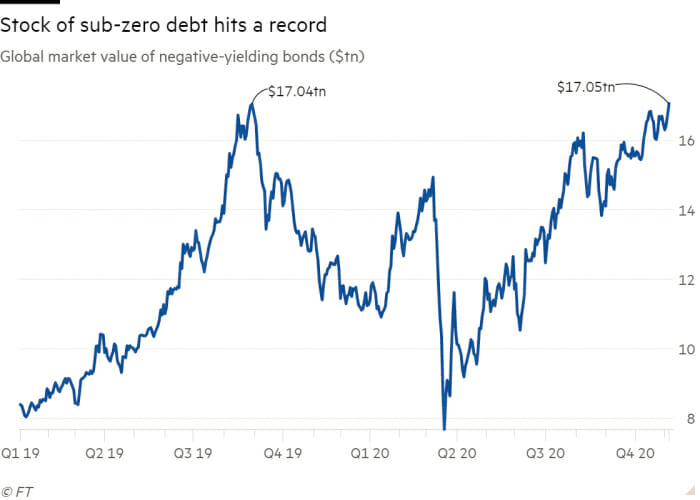
Election day has passed and the potential vaccines for COVID-19 may have arrived. Many investors ask, “Now what are we supposed to do?” As investors, our goal is to gather seemingly unconnected pieces of information and merge them into meaningful context to help guide our investment decisions. Imagine Sherlock Holmes as we begin our search for evidence and clues. (This article won’t review every metric, though it can be viewed as a good starting point.)
Election Outcomes
According to NBC News, an estimated 159.8 million Americans voted in the 2020 presidential election, representing 66.8% of the 239.2 million “voting-eligible” Americans. The total of 159.8 million voters is an all-time U.S. record and
66.8 % is the highest percentage of turnout in 120 years1.
The presidential race has been decided but uncertainty surrounds the balance of power in the Senate. There are two run-off races in Georgia taking place in January 2021 that may determine who controls the Senate. While still maintaining control, Democrats lost seats in the House.
The chart below shows the S&P 500’s performance with a split Congress which may be viewed as a positive as investors care about taxes and regulatory policies.

Vaccines
The November 9 announcement from Pfizer and its partner, BioNTech, released preliminary results which suggested their vaccine was more than 90% effective in preventing infection. It’s worth noting that these results were preliminary, and the vaccine’s effectiveness remains unknown. Other companies are fast tracking their protocols to produce vaccines, as well.
The timeline for a global rollout likely means few people will receive the two-shot vaccine. Even assuming the best-case scenario of a speedy FDA approval this year, it is expected only 25 million people will receive it before New Year’s Day. It is also expected another 650 million people will be able to receive it in 2021 (of which 100 million in U.S., 120 million in Japan, 300 million in Europe).
Herd immunity may eventually limit the spread as well, but recent data2 show the virus is continuing to spread globally. Most of Western Europe is in lockdown while in the U.S., cases, hospitalizations and deaths continue to rise.
While the vaccine news is encouraging, significant details remain to be worked out.
Market Valuations
It is important to note that valuations, in the short term, are often dismissed as they tend not to have an immediate impact on return. Valuations are dreadful predictors of 12-month market returns and I suggest avoiding solely considering them as an investment strategy. However, over the long term, history suggests that valuations are a strong predictor of expected returns.
The chart below, as seen in the Wall Street Journal,3 shows valuations are expensive by most measures.

Velocity of Money
Velocity of money measures the rate that money is exchanged in our economy for goods and services.
Federal Reserve Bank of St. Louis data show that the “velocity of money” in the U.S. was 1.104 in the 2nd quarter 20204, the lowest ever recorded in our country.

The Search for Yield and Global Debt
According to Bloomberg Barclays Global Negative Yielding Debt index, bonds worth $17.05 trillion now trade with a yield below zero5. This is a sign that there is still immense demand for top rated bonds, despite massive governmental and corporate borrowing.

In my opinion, there is currently a disconnect between the stock market and the real economy. There is always the possibility that this disconnect continues for a while longer as investors have shown little fear of a market correction.
Psychological Aspect
Two behaviors helpful for investors to be aware of are the herding effect and loss aversion. These often operate together compounding an investor’s mistakes over time.
Herding effect is an investor’s belief that as markets are rising, the current price trend will continue indefinitely. The longer the trend lasts, the more stubborn the belief becomes and leading the remaining “holdouts” to finally buy into the market creating an intoxicating state.
Loss aversion refers to a declining market environment where investors slowly realize this decline is larger than expected. As losses grow larger, investors’ anxiety of losses mount until they seek to avoid any further loss by selling.
It is also helpful to remember that at bull market cycle peaks, investors tend to ignore evidence at their own financial jeopardy.
While it is important to have your investments work to make money, I believe it is more important not to lose money. I believe that understanding what drives market returns over time (rather than trying to predict future market movements) investors can begin to understand the impact the market has on their psychology and investment behaviors.
In the short run, stock market movements are completely random, though it is essential to be aware of the evidence and clues presented.

The Knapp Advisory Group is here to be your resource in your quest for financial independence.
Contact at JAMES.KNAPP@KNAPPADVISORY.COM.
James C. Knapp, AIF®, BFA™, CPFA®
Securities and advisory services offered through LPL Financial, a Registered Investment Advisor, Member FINRA/SIPC
The material and opinions voiced in this material are for general information only and are not intended to provide specific advice or recommendations for any individual. There is no assurance that the views or strategies discussed are suitable for all investors or will yield positive outcomes. Investing involves risks including possible loss of principal. Any economic forecasts set forth may not develop as predicted and are subject to change.
References to markets, asset classes, and sectors are generally regarding the corresponding market index. Indexes are unmanaged statistical composites and cannot be invested into directly. Index performance is not indicative of the performance of any investment and do not reflect fees, expenses, or sales charges. All performance referenced is historical and is no guarantee of future results.
Any company names noted herein are for educational purposes only and not an indication of trading intent or a solicitation of their products or services. LPL Financial does not provide research on individual equities. All information is believed to be from reliable sources; however, LPL Financial makes no representation as to its completeness or accuracy.
Bloomberg Barclays Global Aggregate Negative Yielding Debt represents the negative yielding segment of the global investment grade debt from twenty-four local currency markets. This multi-currency benchmark includes treasury, government-related, corporate and securitized fixed-rate bonds from both developed and emerging market issuers.
Portions of the materials have been prepared by LPL Financial.
- https://www.cnbc.com/2020/11/04/2020-election-sees- record-high-turnout-with-at-least-159point8-million-votes- projected.html
- https://www.worldometers.info/coronavirus/?utm_campaign=homeAdvegas1?%22%20%5Cl%20%22countries
- https://realinvestmentadvice.com/investors-ignore-evidence-at-their-financial-peril/
- https://fred.stlouisfed.org/series/M2V
- https://www.ft.com



































































































































































